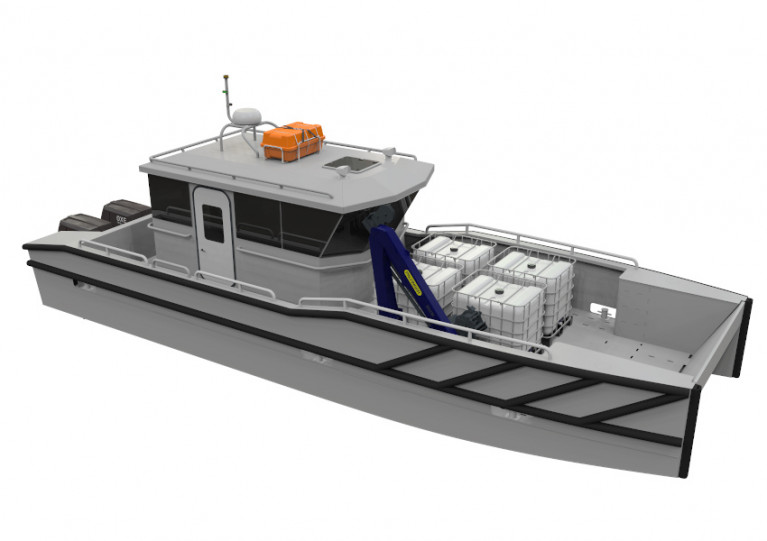Displaying items by tag: Chartwell Marine
Design Unveiled for World’s First Methanol-Powered Leisure Vessel
Archipelago Yachts, in collaboration with Chartwell Marine, has unveiled the design for its groundbreaking zero-carbon leisure vessel, the Archipelago zero.63.
The company aims to set a new benchmark for sustainability in the leisure marine industry with the zero.63, which boasts a revolutionary parallel hybrid propulsion system.
This system seamlessly combines the clean energy derived from a pair of methanol reformers and hydrogen fuel cells — and allows the vessel to cruise silently at speeds of up to 10 knots.
For high-speed performance, the design includes a direct-injection methanol engine, enabling the boat to reach a top speed of 22 knots.
One of the most remarkable features of this vessel is its substantial 10,000-litre methanol tank, providing an expected range of around 2,500 nautical miles — making it a highly versatile and long-range option for adventure-seekers.
Built from low-impact aluminium, the Archipelago zero.63 can comfortably accommodate eight passengers in four luxurious cabins, all equipped with ensuite facilities and ensuring a premium yet eco-conscious cruising experience.
To ensure the safety and integrity of the zero.63, extensive assessments were conducted in collaboration with Lloyd’s Register, assuring the highest standards in design and construction.
The project also aligns with Innovate UK’s “Transport Vision 2050”, which aims to incorporate methanol as a viable marine fuel, targeting approximately 25 per cent usage by 2050. Chartwell Marine has secured an Innovate UK Smart Grant to support its dedication to advancing sustainable marine technology.
 An overview of the Archipelago zero.63’s hybrid methanol propulsion system
An overview of the Archipelago zero.63’s hybrid methanol propulsion system
With the design phase now complete, Archipelago Yachts and Chartwell Marine are primed to build and unveil the Methanol Pathfinder UK, a one-of-a-kind demonstrator vessel that will showcase the potential of methanol as a marine fuel and lead the way towards a greener future for the marine industry.
The Methanol Pathfinder UK will serve as a platform for proof of concept, inspiring confidence among manufacturers and innovators in the marine sector. It promises to be cost-effective to build, making it an attractive proposition for banks and funders.
Moreover, its hydrodynamic design — reminiscent of crew and fast ferry transport vessels — opens up opportunities for commercial exploitation and deployment worldwide.
Dr Stephen Weatherley, founder and managing director of Archipelago Yachts said: “Our vessel design uses methanol-to-hydrogen reforming technology to power a modern and attractive, silent, zero-carbon 63-foot leisure vessel. The yacht will be state of the art for zero-carbon technology, built from low-impact aluminium, using recycled materials wherever possible.
“There are plenty of electric leisure vessels in the market which can travel short distances quickly or long distances slowly, but none can perform in high sea states, cross oceans and be zero-carbon all at the same time.”
Andy Page, managing director of Chartwell Marine added: “Utilising methanol as a feedstock for onboard propulsion and hotel loads is a real alternative to using diesel. The system developed for the zero.63 is simple, robust and manageable in terms of weight and geometry without significant compromise to the vessel aesthetic, interior or function.
“Using a parallel-hybrid propulsion system allows owners to operate the yacht silently using electric propulsion, as well as methanol combustion for high-speed operation.”
The partners hope that the zero.63 will empower other maritime organisations to embrace methanol-powered craft and ultimately reshape the future of marine travel, setting the course for a greener and more sustainable industry.
For more information, visit the Archipelago Yachts website.
Chartwell Marine Unveils New Landing Craft to Support Irish Offshore Energy Operations
British boatbuilder Chartwell Marine has unveiled its bespoke 12m landing craft commissioned by a leading Dublin boat charter company to support large-scale offshore energy projects.
The aluminium vessel for Irish Commercial Charter Boats (ICCB) will be constructed at Arklow Marine Services, with a view to hitting the water this summer.
And according to Chartwell Marine, it sets the stage “for a rapid build-out of the Irish offshore fleet in the next few years, as new large-scale energy projects come online”.
The company says the “market-first” craft has been designed “to meet ICCB’s expanding operational requirements, including surveying, assisting with cable landing and transporting supplies and personnel to near-shore offshore installations”.
It will be powered by two OXE diesel outboard engines, plus room for a spare onboard, with the flexibility to replace these with electric outboard motors in future.
And its shallow draft, allowing it to operate in depts of just 0.8 metres, will ensure “maximum versatility in the shallow waters around the East Irish coast”.
ICCB director Eoin Grimes said: “We’re excited to help drive the development of the next generation of Irish offshore support vessels.
“Chartwell Marine’s vessel offers us unparalleled manoeuvrability and versatility, especially in the shallow waters around Ireland, which will be vital as we continue to diversify our offering to the offshore energy market.”
























































